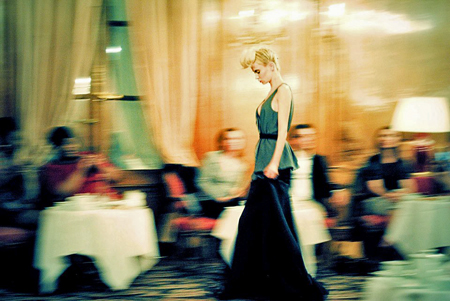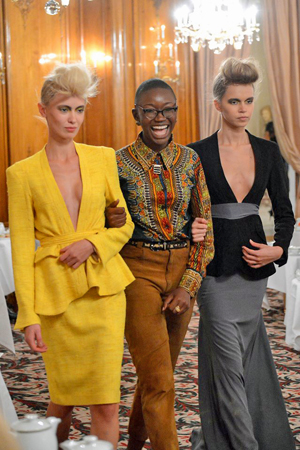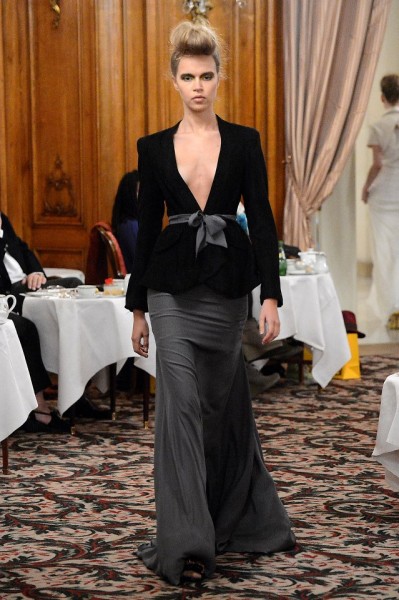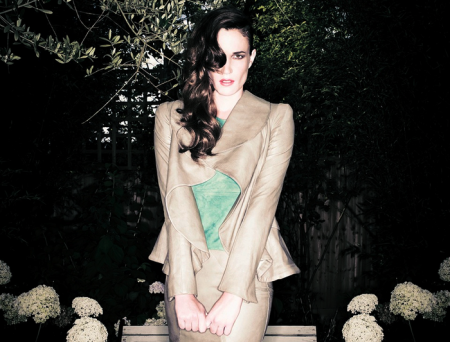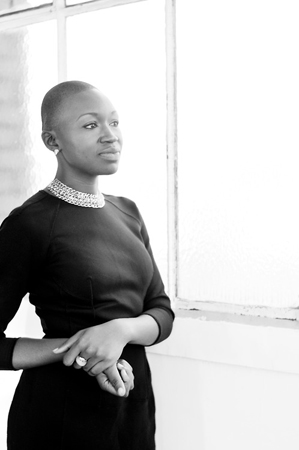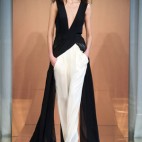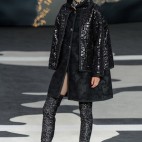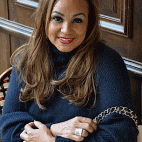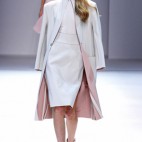Jan.
17
Adama Kai, in Paris
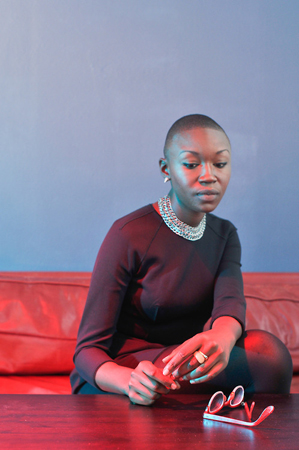 “I can’t allow the world to dictate to me what I should and should not be designing based on my ethnicity.”
“I can’t allow the world to dictate to me what I should and should not be designing based on my ethnicity.”
ADAMA KAI is a fashion designer on the rise determined to conquer the world of fashion on her own terms.
Born in New Jersey, Adama grew up in Addis Ababa, Ethiopia with an early passion for clothes and fashion design. After boarding school, Adama attended the Parsons School of Design in Paris where she interned at several fashion houses before moving to New York. In New York, Adama worked for Flaunt magazine and Magnet Management. After years of working on fashion campaigns for brands like Versace and Prada, Adama decided it was time to strike out on her own, so she moved to Sierra Leone and launched Aschobi Designs.
Since its debut, Aschobi Designs has been featured in international media like Reuters, BBC and CNN, but it was during Paris Fashion Week last fall that Adama experienced her greatest fashion achievement to date by presenting her collection at the Hotel Bristol with influential retailers like Maria Luisa Poumaillou in attendance.
As we get closer to the Fall 2013 fashion presentations, I thought you might appreciate hearing from an up and coming designer who’s certain to leave an indelible mark on the fashion industry in the years to come.
Adama, as a child growing up, you lived in Africa, Europe and USA, how did those cultural experiences affect how you view fashion? the world?
I feel really fortunate to have had the opportunity to grow up all over the globe. It made me appreciate the diversity of cultures the world has to offer at a very young age. So naturally I find myself attracted to how these diversities are represented in their respective fashion industries. From Islamabad fashion week to Lagos fashion week and Sao Paolo fashion week the rise of designers representing their countries whilst using their cultures as inspiration for the creation of their collections is extremely interesting to me. It offers me a window from which I can learn from and be inspired to take my personal research for my own brand when looking at various cultures for inspiration as well as my own Sierra Leonean culture.
When did you know that you wanted to be a fashion designer?
I have always liked clothes. My mother was a seamstress whilst she attended high school, she also would make our Halloween costumes when we were younger, so I definitely think that rubbed off on me. My interest in fashion really started to flourish when I switched boarding schools and no longer had to wear a uniform and instead had a dress code to adhere by. I found myself stepping away from the usual J.Crew and Abercrombie and Fitch prep school attire of khaki’s and crew neck sweaters that most students wore. I felt the need to take advantage of this new liberation of wearing what I wanted to wear.
Where did you study fashion design?
I studied at the Parsons School of Design, Paris campus.
What type of fashion designer do you want to be?
I want to be the kind of designer that makes people look forward and confident to getting dressed, whatever the occasion.
Do you find it difficult to move beyond people’s expectations of what designers of African descent should present to the world?
I have no problem moving beyond such expectations because when I fill out paper work for my professional/personal life and I am faced with questions such as “what is my occupation” I don’t put down “African Designer” I simply write “Designer”. I share this same approach with my work. I can’t allow the world to dictate to me what I should and should not be designing based on my ethnicity.
Africa is finally being targeted as a growth sector for fashion and luxury, how do you plan to impact this burgeoning market?
I am really excited with the rise of interest in African fashion and the luxury industry. I think that it is allowing the continent to take a moment and look back at our history of craftsmanship in functional art. I am even more excited to be here in Europe to have access to countries like France and Italy that have built their own respective luxury industries through such attention to craftsmanship. I am absorbing all of this with fresh eyes so that I too can go back to my continent and contribute to the resurrection of quality goods being produced in Africa.
Any plans for an Aschobi presentation in the USA?
You know we presented at Harvard several years ago in the very beginning of ASCHOBI’s creation. It is definitely a goal to return when the time is right. So lets just say that I will keep you posted.
Your offices are located on the famed Rue Cambon in Paris, was that intentional as a source of inspiration?
Anyone that knows the story of Rue Cambon will know that my decision to give ASCHOBI this address was definitely intentional. I am working in an industry that thrives on image and perceptions. My goal is to do everything in my power to make sure ASCHOBI has the chance to compete.
Why the name Aschobi?
I love ASCHOBI. I love what it signifies, the celebration in which we wear clothes. ASCHOBI is a cloth, a fabric, and a textile that is chosen by any individual, to be worn in any cut, and sewn in any style for the celebration of any occasion. The best example would be a wedding. If I were to get married I would select an ASCHOBI to be worn by my side of the family and my fiancé would select a different ASCHOBI to be worn by his side of the family…even the bridal party can decide amongst themselves to select an ASCHOBI for the wedding day or events leading up to the wedding. It is custom to gift the cloth to close family members and prominent individuals that will attend the wedding. As a couple we also have the option of letting our guests know of a location where they can purchase our respective ASCHOBI’s. And on our wedding day, amidst the joyous celebration, whilst we may not have the time to meet and greet all of our guests, we will know they are there celebrating our union, as they will be wearing our respective ASCHOBI’s in their own individual styles. It is a way to be exclusively inclusive, an idea that goes hand in hand with luxury.
Describe the ideal Aschobi woman.
The ideal ASCHOBI woman is a global professional, a woman that embodies the spirit of the multicultural cosmopolite, at ease anywhere in the world. She is in the moment yet timeless. She is demure yet daring. Her allure is an indulgence in sophistication. Her look is an intoxication of sensuality. She knows and loves who she is.
Does your personal style differ much from the Aschobi woman you design for?
It doesn’t differ all together…however my personal style has a lot to do with how I am feeling at the time and thus it is not as consistent as the classic style of the ASCHOBI woman.
Name one unforgettable place you’ve traveled to.
I made my first trip to China a year or two ago and I took a train ride from Beijing all the way down south to Guangzhou. The train ride took me right through the heart of the interior through ancient towns and emerging cities. My window was like a moving picture. I got off the train every stop we made. WOW! What phenomenal land and extraordinary people.
Name one place you’d like to see before you die.
Yucatan Peninsula, Mexico
How do you create balance in your life?
I try to surround myself with people that love and care for me…people that want the best for me. For now this is the only way I can create any sort of balance. As much as I try to be in control of everything that is happening in my life with my career and ASCHOBI, I can’t control it all. But the one thing I can be in control of is the people I let into my life. They are the ones that bring the balance that I need.
Name a song that takes you some place special whenever you hear it.
Not one song but an entire album titled “THE MUSIC IN MY HEAD” it’s a gem of sounds from the golden age of African pop. You can find some of the tunes on YouTube and buy the album on Amazon. I have not been able to find it anywhere else. Yolanda, get it right now, for your listening pleasure!
One word…
OPTIMISTIC!!!
What advice do you have for other women?
As a citizen of this world I would say every day when you wake up and approach your day be the best version of yourself that you can be. This is how we move forward collectively to bring about change.
When asked to write your memoirs, what will the title be?
That’s a hard one to answer at this stage as I am just getting started…but for now…the title would probably read “FROM PADEMBA ROAD TO THE WORLD”.
Interviewed December 2012 by Yolanda, editor of Zavvi Rodaine.
Images used with kind permission of Adama Kargbo and Aschobi Designs.
© Zavvi Rodaine.com 2013. No part of this interview may be used or reproduced in any manner without the express written consent of the Editor of Zavvi Rodaine.com.
| • Fashion, Life + Style | • Comments Off on Adama Kai, in Paris |


